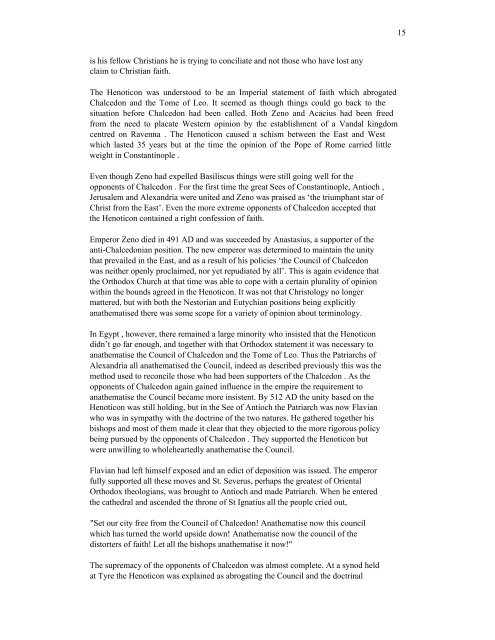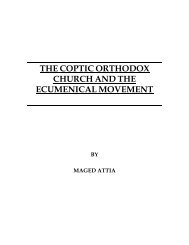Coptic interpretations of the Fourth Ecumenical Council - Saint Mina ...
Coptic interpretations of the Fourth Ecumenical Council - Saint Mina ...
Coptic interpretations of the Fourth Ecumenical Council - Saint Mina ...
Create successful ePaper yourself
Turn your PDF publications into a flip-book with our unique Google optimized e-Paper software.
is his fellow Christians he is trying to conciliate and not those who have lost any<br />
claim to Christian faith.<br />
The Henoticon was understood to be an Imperial statement <strong>of</strong> faith which abrogated<br />
Chalcedon and <strong>the</strong> Tome <strong>of</strong> Leo. It seemed as though things could go back to <strong>the</strong><br />
situation before Chalcedon had been called. Both Zeno and Acacius had been freed<br />
from <strong>the</strong> need to placate Western opinion by <strong>the</strong> establishment <strong>of</strong> a Vandal kingdom<br />
centred on Ravenna . The Henoticon caused a schism between <strong>the</strong> East and West<br />
which lasted 35 years but at <strong>the</strong> time <strong>the</strong> opinion <strong>of</strong> <strong>the</strong> Pope <strong>of</strong> Rome carried little<br />
weight in Constantinople .<br />
Even though Zeno had expelled Basiliscus things were still going well for <strong>the</strong><br />
opponents <strong>of</strong> Chalcedon . For <strong>the</strong> first time <strong>the</strong> great Sees <strong>of</strong> Constantinople, Antioch ,<br />
Jerusalem and Alexandria were united and Zeno was praised as ‘<strong>the</strong> triumphant star <strong>of</strong><br />
Christ from <strong>the</strong> East’. Even <strong>the</strong> more extreme opponents <strong>of</strong> Chalcedon accepted that<br />
<strong>the</strong> Henoticon contained a right confession <strong>of</strong> faith.<br />
Emperor Zeno died in 491 AD and was succeeded by Anastasius, a supporter <strong>of</strong> <strong>the</strong><br />
anti-Chalcedonian position. The new emperor was determined to maintain <strong>the</strong> unity<br />
that prevailed in <strong>the</strong> East, and as a result <strong>of</strong> his policies ‘<strong>the</strong> <strong>Council</strong> <strong>of</strong> Chalcedon<br />
was nei<strong>the</strong>r openly proclaimed, nor yet repudiated by all’. This is again evidence that<br />
<strong>the</strong> Orthodox Church at that time was able to cope with a certain plurality <strong>of</strong> opinion<br />
within <strong>the</strong> bounds agreed in <strong>the</strong> Henoticon. It was not that Christology no longer<br />
mattered, but with both <strong>the</strong> Nestorian and Eutychian positions being explicitly<br />
ana<strong>the</strong>matised <strong>the</strong>re was some scope for a variety <strong>of</strong> opinion about terminology.<br />
In Egypt , however, <strong>the</strong>re remained a large minority who insisted that <strong>the</strong> Henoticon<br />
didn’t go far enough, and toge<strong>the</strong>r with that Orthodox statement it was necessary to<br />
ana<strong>the</strong>matise <strong>the</strong> <strong>Council</strong> <strong>of</strong> Chalcedon and <strong>the</strong> Tome <strong>of</strong> Leo. Thus <strong>the</strong> Patriarchs <strong>of</strong><br />
Alexandria all ana<strong>the</strong>matised <strong>the</strong> <strong>Council</strong>, indeed as described previously this was <strong>the</strong><br />
method used to reconcile those who had been supporters <strong>of</strong> <strong>the</strong> Chalcedon . As <strong>the</strong><br />
opponents <strong>of</strong> Chalcedon again gained influence in <strong>the</strong> empire <strong>the</strong> requirement to<br />
ana<strong>the</strong>matise <strong>the</strong> <strong>Council</strong> became more insistent. By 512 AD <strong>the</strong> unity based on <strong>the</strong><br />
Henoticon was still holding, but in <strong>the</strong> See <strong>of</strong> Antioch <strong>the</strong> Patriarch was now Flavian<br />
who was in sympathy with <strong>the</strong> doctrine <strong>of</strong> <strong>the</strong> two natures. He ga<strong>the</strong>red toge<strong>the</strong>r his<br />
bishops and most <strong>of</strong> <strong>the</strong>m made it clear that <strong>the</strong>y objected to <strong>the</strong> more rigorous policy<br />
being pursued by <strong>the</strong> opponents <strong>of</strong> Chalcedon . They supported <strong>the</strong> Henoticon but<br />
were unwilling to wholeheartedly ana<strong>the</strong>matise <strong>the</strong> <strong>Council</strong>.<br />
Flavian had left himself exposed and an edict <strong>of</strong> deposition was issued. The emperor<br />
fully supported all <strong>the</strong>se moves and St. Severus, perhaps <strong>the</strong> greatest <strong>of</strong> Oriental<br />
Orthodox <strong>the</strong>ologians, was brought to Antioch and made Patriarch. When he entered<br />
<strong>the</strong> ca<strong>the</strong>dral and ascended <strong>the</strong> throne <strong>of</strong> St Ignatius all <strong>the</strong> people cried out,<br />
"Set our city free from <strong>the</strong> <strong>Council</strong> <strong>of</strong> Chalcedon! Ana<strong>the</strong>matise now this council<br />
which has turned <strong>the</strong> world upside down! Ana<strong>the</strong>matise now <strong>the</strong> council <strong>of</strong> <strong>the</strong><br />
distorters <strong>of</strong> faith! Let all <strong>the</strong> bishops ana<strong>the</strong>matise it now!"<br />
The supremacy <strong>of</strong> <strong>the</strong> opponents <strong>of</strong> Chalcedon was almost complete. At a synod held<br />
at Tyre <strong>the</strong> Henoticon was explained as abrogating <strong>the</strong> <strong>Council</strong> and <strong>the</strong> doctrinal<br />
15








